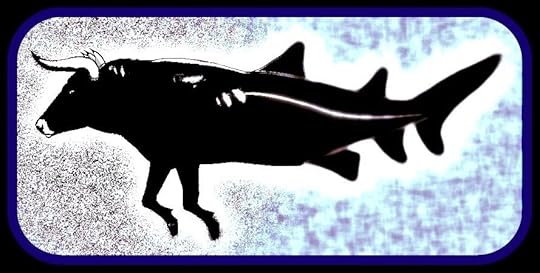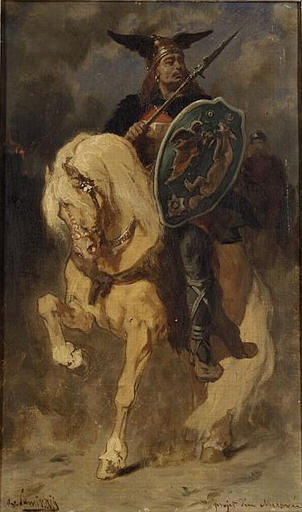Why Merovingians claimed a sea monster as ancestor
 By Warinhari, CC BY-SA 4.0, via Wikimedia Commons
By Warinhari, CC BY-SA 4.0, via Wikimedia CommonsAs I researched Duchess of the New Dawn (to be published June 16, 2026), I came across an intriguing story, one that might help explain how a family was able to rule over the early medieval Franks for about 300 years. Merovech (fl. 450), founder of the Merovingian dynasty, could claim two fathers: a human king and a sea monster, and I don’t mean in a two daddies kind of way. That is, if we are to believe the chronicler Fredegar and that he wasn’t joking.
About two centuries after Merovech’s lifetime, Fredegar wrote that this ruler’s mother, the wife of Chlodio, went into the sea to bathe and encountered a creature of Neptune like a quinotaur. Then she became pregnant by either her husband or the beast – that is what the chronicle says – and gave birth to Merovech, whose name means “sea bull.”
What exactly is a quinotaur? There are various interpretations of the word’s etymology, but the common conclusion is that it’s half bull and half fish, sea-serpent, or dragon. (The quinotaur above looks half-bull, half-shark, but you get the idea.)
It is possible that the story had been around a long time before Fredegar put pen to parchment (or stylus to wax tablet). Perhaps the divine being had been a god but was changed into a monster when the Franks accepted Christianity. After all, Christianity has only one God. Nevertheless, the tale allowed Merovech and his descendants to assert connections to an important family in the earthly realm and to the supernatural, a practice that goes all the way back to ancient times.
 A 19th century painting depicting Merovech, by Évariste-Vital Luminais, public domain, via Wikimedia Commons
A 19th century painting depicting Merovech, by Évariste-Vital Luminais, public domain, via Wikimedia CommonsMerovingian kings also distinguished themselves from other men by never cutting their hair – their long locks symbolized royalty and mystical power, both as pagans and Christians embracing the Hebrew Bible. (Deposed kings who were tonsured often tried to reclaim power after their hair grew back.)
Merovingians are often unfairly portrayed as “do nothing” kings – we can thank the propaganda of their successors, the Carolingians, for that. While mayors of the palace (one of whom was a forefather of the Carolingians) raised armies and waged war, the Merovingian monarchs – set apart from other powerful individuals because of unearthly ancestry – provided moral authority and could get dukes in the outlying territories such as Bavaria and Alemania to swear loyalty to them.
It is a solid reason kings in this era commonly professed otherworldly forebears even after converting to Christianity. When Merovech’s grandson King Clovis accepted baptism in 496 or 508, he apparently did not renounce his possible sea-monster great-grandfather.
Fast forward to the 750s, when Pippin, the first Carolingian king, seizes the throne from a Merovingian in a bloodless coup. Pippin did not claim a supernatural being of any kind as ancestor, but he sought a connection with the divine. After being elected king by his fellow Franks and securing support from the pope, he had himself and his wife anointed by Archbishop Boniface, in a custom similar to those in the Hebrew Bible. Being God’s anointed was far more powerful than a blood tie to a sea monster.
My characters in my forthcoming novel Duchess of the New Dawn make references to the Merovingians’ supernatural ancestry. Preorder now on Amazon, Barnes & Noble, or another vendor. If you’d like to read my fiction before Duchess is released, I have three other novels featuring heroines in early medieval Francia. If you are one of those super-organized people who does Christmas shopping early, remember books make great gifts.
Sources
“Deconstructing the Merovingian Family” by Ian Wood in The Construction of Communities in the Early Middle Ages: Texts, Resources and Artefacts
Secrets of the Serpent: In Search of the Sacred Past by Philip Gardiner “The long-haired kings of the Franks: ‘like so many Samsons?’” by Erik Goosmann in Early Medieval Europe



